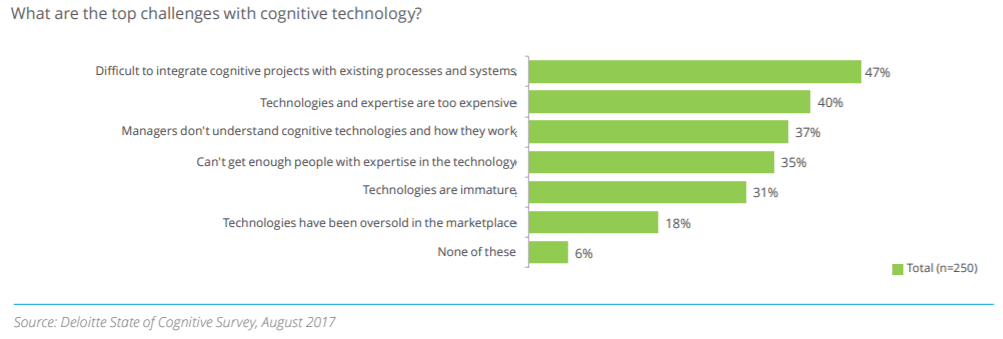The challenges of AI projects
In their 2017 survey of AI, Deloitte summarises the major challenges of Artificial Intelligence projects into three areas, albeit the lower level of detail identifies a collection of issues:

These are:
- A lack of business alignment, where the low levels of knowledge about AI hinder business understanding of use cases and how they drive return on investment. Clarity of purpose gives integration into your business processes and existing systems a greater ability to deliver ROI.
- The difficulty of finding enough adequately skilled resources, notably data scientists and modellers
- The difficulty of assessing vendors and cutting through the technology hype. As ever….
On the face of it, this is much to be expected in that the same issues have always faced technology projects. It’s the novelty of the technology though that heightens these challenges, and makes it all the more important to get the right support.
A business case is not about the numbers
Finding where you will deliver a return on your investment will naturally be that bit tougher than implementing a reasonably established piece of technology where the principles are reasonably well understood and the impact on your business processes and people can be worked out with a fair degree of exactness. Where any one of these is ‘looser’ in terms of its specificity drives the individual nature of how you will implement it, how you manage the risk of the project and ultimately the delivery of your ROI.
Where all three are less well-defined, inevitably the challenge is greater and it becomes even more important to understand the feasibility of the technology for your organisation. This will involve a number of dimensions that affect the numbers of the business case:
- Where are your use cases? Which business functions do they affect, and how?
- Are you looking for process efficiency or increased sales capability, market differentiation and competitiveness?
- What is the nature of the technology that will deliver it?
- What skills and resources do you need?
Given this degree of variability, it is entirely reasonable for the senior executives of your business to challenge the IT function with a big ‘So what?’. Yes, you can connect together all sorts of devices and gather data, but why should we, isn’t AI simply the latest hammer looking for a nail?
Get the right support
When faced with the challenges of AI, it’s less important that you find examples of the very same use cases as you are thinking of in another business, than it is to really appreciate the technology and how your organisation will get benefit from it. You don’t need to consider AI as a giant leap forward, as the business case can often be found in the next level of process automation and problem solving in your business. Forget the AI tag and think of it as a new technological capability that you don’t have currently.
To that end, solutions that worked for other organisations can very easily narrow your vision, your understanding of the capability of the technology and what it means for you. Far better to adopt the right approach to understand technology and apply it to your circumstances to think through the implications more objectively.
In Summary
Finding your business case and understanding what you are trying to achieve are much more pointed questions for AI projects than for ‘traditional’ systems projects like ERP.
If you wish to share your thoughts on this article, you are welcome to comment below, or to contact the author, email [email protected].

